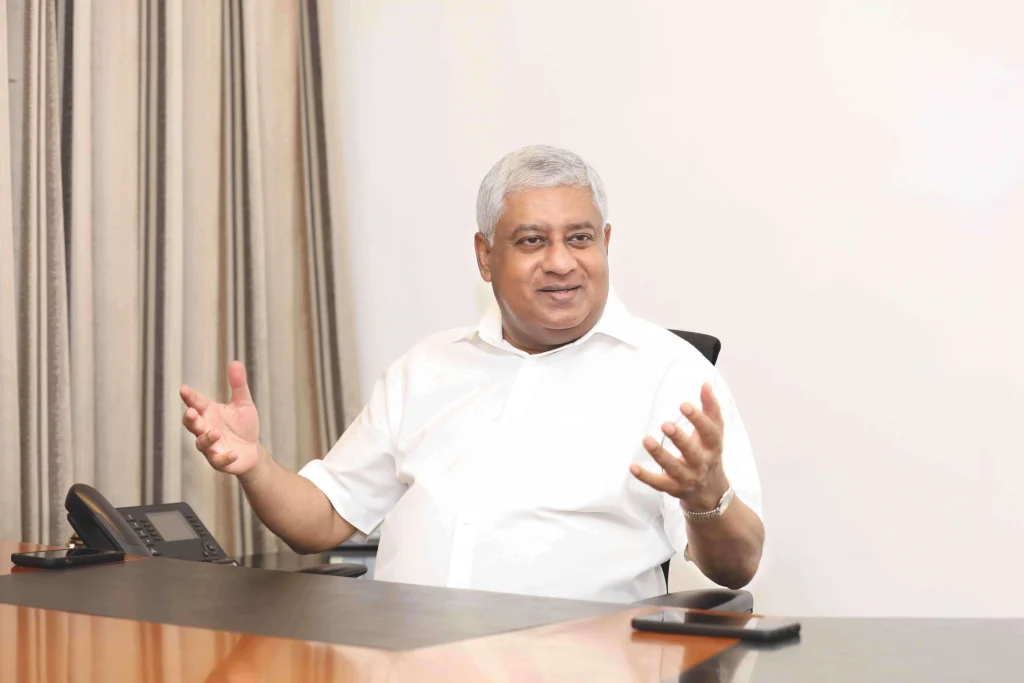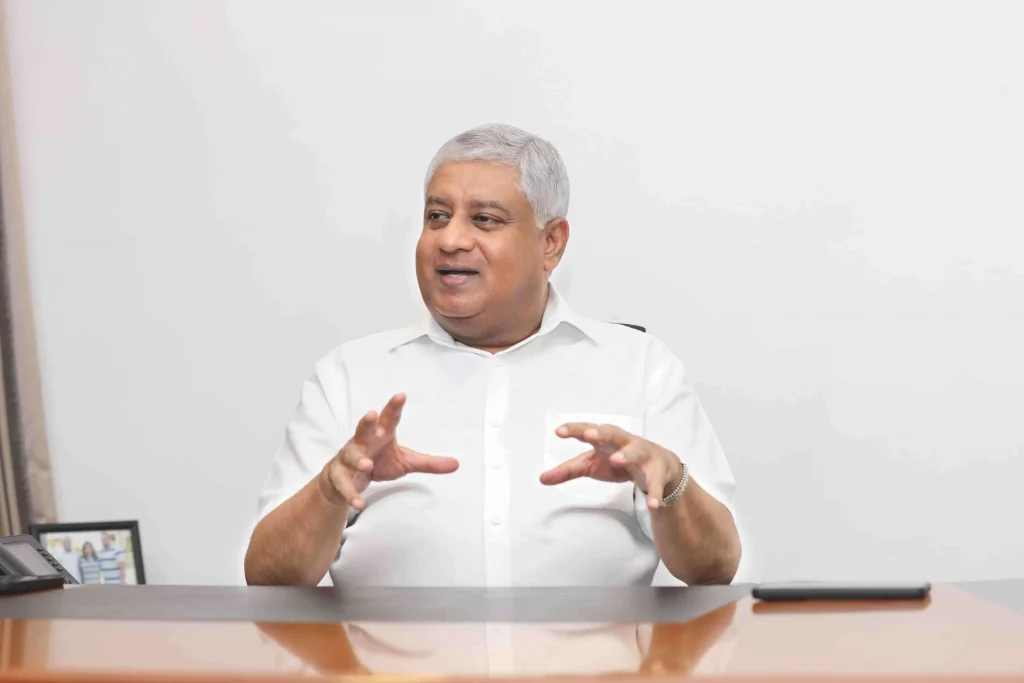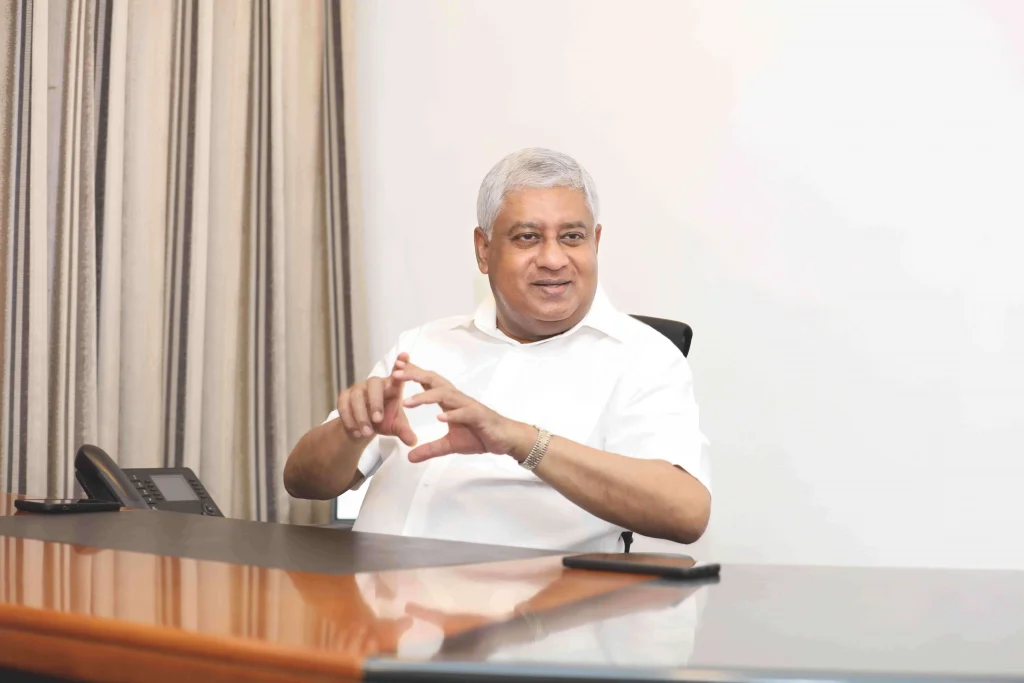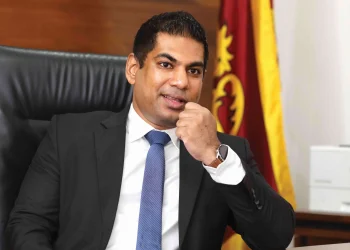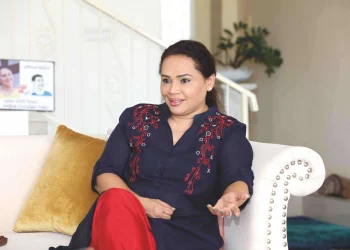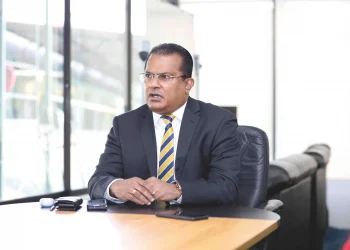Tiran Alles, Minister of Public Security, accepted a challenging portfolio during a difficult time for Sri Lanka. Entering the political limelight in 2005 with the election of Mahinda Rajapaksa, where he played a leading role. As Minister of Public Security, he has restored the strength of the Police to act against lawbreakers. He is determined to take stern action against unlawful protests derailing Government efforts to restore normalcy and rebuild the economy. Speaking to Business Today, Minister Tiran Alles admitted that much had suffered in the last two years, including Police development, further intensified by the uprising that relegated the Police to mere bystanders. Having turned around that trajectory, Minister Alles said that the lawbreakers could no longer take the Police lightly, with him giving his support to let them carry out the duties of their office efficiently. Known for his acquaintance across the political divide, Tiran Alles may be the embodiment of trying to be a “friend to all, enemy to none.” That might serve well if he, as he desires, succeeds in uniting all factions in the Sri Lankan House of Cards before it gives way under the weight of factionalism.
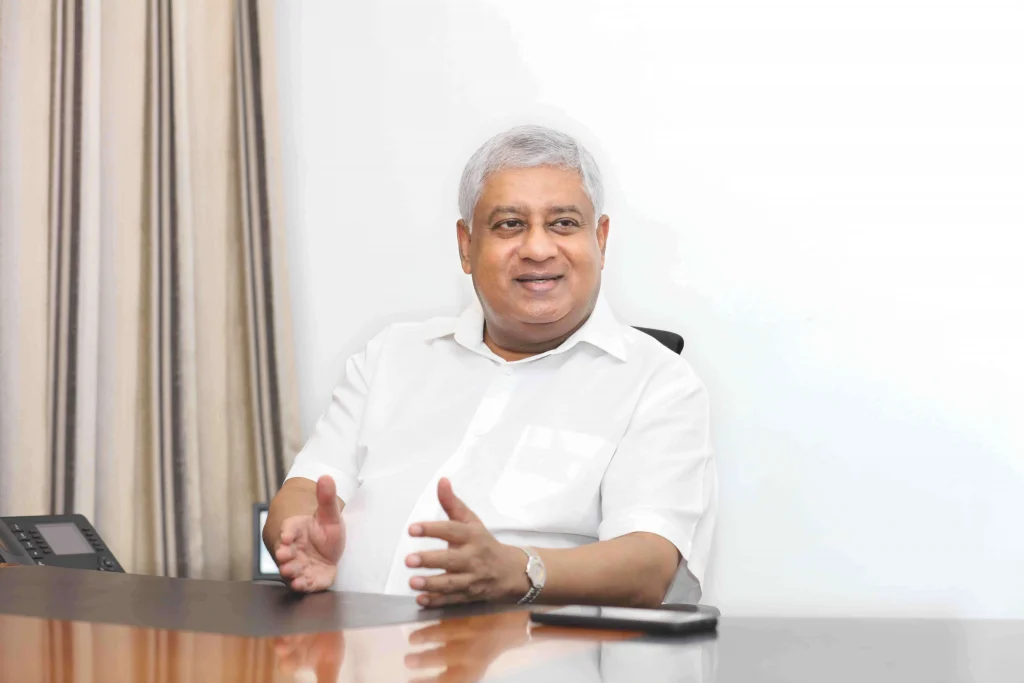
Words: Jennifer Paldano Goonewardane.
Photography: Sujith Heenatigala and Dinesh Fernando.
What made you accept the public security portfolio when none in the Government wanted to take it?
I took over as the Minister of Public Security when the Police and the Army were helpless in ensuring law and order in the country. I wasn’t the minister when the May 9th incidents occurred. As the country went into mayhem and anarchy, with no prime minister or a cabinet, former President Gotabaya Rajapaksa invited me to take over as public security minister. The country was on fire, and public security was in jeopardy. My task was enormous as we had a very demoralized Police force who were being treated poorly and disrespectfully for doing their duty. Even senior DIGs and SSPs couldn’t administer a court order to the protestors who would insult them. Senior Police officers had to plead with the protestors to vacate the sites. We were economically bankrupt when the protests erupted. But subsequently, as the protests dragged on, a bad situation worsened. The country’s economy suffered further as economic activities got hampered and cost the country billions of rupees. The longer the protests continued, the cost to the country kept escalating. It was already a bleak situation where businesses were shutting down, but the protestors were worsening the situation. The whole episode looks like a coup to me. I took over a challenging portfolio to establish normalcy to ensure that we could do everything needed to bring the country out of its current mess.
As the Minister for Public Security, can you tell us the primary sectors under your purview? What are some of the urgent public security concerns in the current context in Sri Lanka?
I’m in charge of the Police Department, the STF, and the National Secretariat for Non-Governmental Organizations. Right now, the Police officers spend the majority of their time sorting issues related to the Aragalaya, which involves being on duty at protests that take place regularly to ensure that the situation doesn’t get out of hand. The situation has settled down considerably from what it was, but there are elements even today that want to create issues to disturb the peace. I don’t oppose peaceful protestors if they have a legitimate reason, such as if they oppose a government decision or the cost of living and shortage of fuel. The problem is that some go beyond the legitimate reasons to demand the government and the president resign, which becomes a protest to overthrow the government. That’s where we have to mediate to ensure that law and order prevail and those responsible are accountable.
Would you agree that a few months ago, we witnessed the Police facing limitations in using their power to take action with hands tied to the back? How have you ensured that the Police can carry out their duty without being hindered?
Unfortunately, in the past, the Police had issues regarding taking action and were unable to take action. Police officers were humiliated by the protestors. I believe the entire country witnessed scenes of Police officers being treated harshly and humiliated before the cameras. I have taken a stand that Police officers cannot be insulted because they have the power to act, and I have instructed them to use their authority to ensure they maintain law and order in the country. I have given them the blessing and my backing to take action within the country’s legal framework when people break the law.
How ready are we to ensure a safe environment for tourists as the country focuses on reviving the tourism industry, especially in the context of several reported incidents?
As the country renews its thrust to bring in more tourists, we have to ensure that they feel safe to travel and not feel hindered by protests and roadblocks. When we speak of bringing back the tourists, we cannot forget the ugly sight of the Gota Go Gama in Galle Face Green, which was in the heart of the city where five-star hotels and shopping malls are situated, an area that is considered a tourist hotspot. When they were occupying such a prime location where unsightly structures were spoiling the surrounding, we could not expect tourists. And that’s precisely why we had to manage the protests and urged the protestors to dismantle the Gota Go Gama and the Myna Go Gama near Temple Trees. At least now, tourists will see a clean city functioning as it should. I believe that was an issue, an issue that was preventing tourists from visiting Sri Lanka. At the same time, as reported in the media, we must ensure female tourists are safe while on holiday here. Isolated incidents do occur, but I doubt whether that’s frequent. To ensure that people are safe in the evening to enjoy the nightlife, we have the Police out there patrolling and checking and also checking for driving under the influence of alcohol. Sri Lanka has a relatively vibrant nightlife patronized by locals and foreigners alike, although currently, I feel people have withdrawn from venturing out at night. With the events of the last few months, families would think twice about going out at night. COVID-19 also prevents people from going out as frequently as they used to. I agree it’s time to create a safe environment to encourage people to venture out again to enjoy the nightlife.
What do you plan to do to equip the Police and introduce technology to make their work more efficient and reliable?
The fact of the matter is that Police stations even lack some of the basic facilities. I’m exploring ways to obtain foreign grants to improve the facilities at Police stations. Before we can think of technology, we have to resolve the most pertinent issues facing Police stations, some of which don’t even have a vehicle. There are Police stations where the Officer in Charge travels in a tuk. Given the current limitations facing the country, we will not be able to fulfill the dearth of requirements and facilities any time soon. We’re working on addressing the issues at Police stations because we have to resolve those basic requirements to provide officers the space to do their work. We’re looking at obtaining credit for this purpose. Before I took over the public security portfolio, there had been negotiations to buy jeeps on the Indian credit line, which had been held back for the past two years. However, we have sorted the issue to purchase 750 jeeps, with the first lot of 250 jeeps expected first and the rest subsequently. Similarly, we’re trying to gradually take note of the urgent requirements in the Police, including the introduction of technology to help them work better. The reality is that even purchasing servers for the IT department has been challenging because the department is short of funds. We’re looking at every aspect and working on it right now.
The problem is that some go beyond the legitimate reasons to demand the government and the president resign, which becomes a protest to overthrow the government.
In this challenging environment, is there a possibility of continuing training, including foreign training for Police officers?
Training programs are at a standstill, especially foreign training, for various reasons. We’re in the process of sorting the issues to recommence training programs. Our training drive will focus on harnessing the potential of the region.
What are some of the most pertinent public security threats that the public should be aware of, take necessary precautions, and cooperate with law enforcement?
The public should be mindful of being misled by false social media news and be mature enough to discern what’s true and what’s not. Disgruntled elements that protest are dragging the public into unwanted situations, which they do by spreading incorrect information. With the current economic situation, crimes have increased with regular complaints of burglaries. The public must be mindful of this reality, be vigilant and careful, take necessary precautions, and cooperate with law enforcement. The Police will take action and make efforts to control such incidents and arrest the criminals, but the episodes that we watch and hear today had occurred before whenever the country’s fortunes were down. However, in the current economic reality, the Police alone cannot be solely responsible for public safety. Given the current spate of incidents, we’re revamping and reviving the Community Police units and local committees to help the general public ensure security in designated areas. The public should also work closely with them to secure their neighborhoods.
Are you saying you’re rebuilding the confidence in the Police to carry out their duty without hindrance?
People had taken over public places for a few days when there was no functioning government. Gradually we had to reverse the situation. The Police had to regain their power to act when they just existed without the authority to work for a few months. Police officers who went to do their duty at places like Gota Go Gama were chased away by protestors, and they had to walk off. But that’s not the situation today. Unfortunately, there was a period when they didn’t get the command to act and were not backed by those in charge. Given the crisis in the country, there seemed to be a leadership vacuum, and they could turn to no one. Right now, the Police have taken control of the situation. People must be cognizant that even to demonstrate, one has to do it within certain boundaries. Any individual who wishes to protest should do so within the limits provided by the law. The law on obtaining Police permission before a protest rally is to ensure that there’s order so that the Police can intervene to make sure that the protestors don’t walk into any street, block the road, or hinder vehicular traffic and people’s movements. It bears upon businesses and daily life. The Police don’t harm or take action when people protest within the boundaries of the law.
In that case, can we expect a friendly and compassionate Police force or a harsher outfit?
Historically the Police force has been neglected. People are quick to judge them but do they know that an officer who dons the uniform at six in the morning will still be on the road at 10pm? No one realizes how much time a Police officer spends at work but is quick to point fingers at them. Their salaries are inadequate. They have poor facilities at most stations, including unsuitable barracks. Unlike the armed forces who get their food while on duty on the road, Police officers don’t have the same privilege. They don’t even have access to a cup of tea. As their minister, I want to improve their situation and, in turn, expect them to do their job efficiently. I wish for a formidable Police force that will not be mere bystanders.
What steps have you taken to curb underworld activities and the drug menace?
With the availability of drugs increasing, we are revamping the Police Narcotics Bureau to conduct operations with the STF to contain the situation. The STF, meanwhile, is continuing operations to confront underworld activities and underworld-backed drug gangs.
You said the uprising looked like a coup. What did you mean by that statement?
I said that the uprising had signs of a coup because of its organized nature. On May 9th, as the country plunged into a chaotic situation, we witnessed a pattern of attacking the residences of politicians around Sri Lanka. We are of the view that it was an attempt at ousting the Government.
As the uprising continued, some private companies, including the blue-chip companies, issued statements urging the President to step down while sanctioning their employees taking part in the Aragalaya. I won’t deny that the people felt the burden of power cuts and fuel shortage which triggered a response. However, the general public protesting against the price hikes and shortages in gas and fuel, which was the real struggle, took a different turn with the entrance of disgruntled elements. People like large company bosses unaffected by the shortages and power cuts endorsed the protests, maybe to appease their employees. The private sector had benefitted from the Government, especially during Gotabaya Rajapaksa’s presidency when they were on the committees the President initiated. The situation worsened with social media influencers feeding false narratives about the country that further affected the economy adversely. There was a total breakdown in discipline as these people began provoking the public with their posts. We witnessed the same indiscipline in how people behaved inside the President’s House. What the world saw was shameful. Mahinda Rajapaksa and Gotabaya Rajapaksa have done much for this country. However, the people have forgotten, especially the young people who know nothing about the events between 1980 and 2009, the ethnic riots, the insurgency, and the war, which they didn’t have to face.
Are you saying social media influencers played a role in inciting protests and violence?
Social media influencers are provoking people with false information, which is enough to create new issues. The continuous protest culture’s genesis was encouraged by YouTubers talking about and speaking against Government action. Some of them weren’t wrong in what they were saying, as something was not right with the Government. If we look back, some YouTubers called people to rise against the Government in protest when facing hardships. Even our households are carried away by their stories and believe them to be true. However, let’s ask some of those who supported the Aragalaya and started the Gota Go Gama about how they feel today. They will tell you how outside elements invaded their space and hijacked the protest. Those who came later into the uprising were bent on violence. I believe we shouldn’t have allowed protestors to set up the Gota Go Gama in the first place. And that’s precisely why we need to regulate cyberspace to create accountability. The more sensational the news, the more views and subscribers they have, and people believe them unquestioningly. It goes beyond provoking people and creating unrest in the country. It’s also negatively impacting the country. We are preparing legislation to curtail the circulation of false news, thereby regulating cyberspace to prevent the damage it’s doing to the country and even to individuals.
Don’t you think the loss to businesses was colossal, and now you have to ensure that there’s law and order for companies to stay open?
The elements encouraging and organizing protests are not here to fix the economy but to overthrow the Government. But when roads get blocked with protestors, it’s businesses that are adversely affected, and that’s why as the minister of public security, I’m firm on deploying the Police to break some protest rallies because they fail to stick to the rules. Today as law and order gradually return to the streets, the business community can heave a sigh of relief that they can continue unhindered because, under my purview, I’ve instructed the Police to take action, disperse any unlawful gatherings, and arrest disruptive elements. Today the Police know that as their minister, I have their backs. Today, I believe that many who were part of protests initially have realized their futility and that they aren’t achieving anything by protesting. Can anyone bring prices down by blocking roads, inconveniencing the public, hindering business places, and stopping traffic? Vehicles burn fuel when stuck in traffic during protests which are unnecessary when the country has a fuel shortage. I say with evidence that some people are tired of the protests. I received a phone call from a university student whose identity I don’t know. He lamented that he was languishing for hours at a pharmacy, unable to get vital medicine for his ailing mother. Having been part of many protests, he had realized their senselessness and appealed that I control them in the future. I was surprised because I received the telephone call out of the blue.
Your party is in the 11-party alliance independent of the Government, yet you occupy a strong cabinet portfolio in the Government. You are also known to maintain cordial relations with everyone across the divide. Don’t you think it’s time everyone came together for the country? Will you do anything about it?
Yes, it’s time for all political parties to unite. Today in my position, I’ll go out of my way to see that everyone unites for the country’s sake. People elected Gotabaya Rajapaksa for five years. I admit that there were problems during his tenure. Maybe it was mismanagement and mishandling that provoked the uprising. However, I believe no one has the right to overthrow a legally elected president or government with a mandate. An election is a platform for change. As soon as Gotabaya Rajapaksa left office and Ranil Wickremesinghe was appointed President, the protestors wanted him out without giving him the chance to prove himself. I believe certain political parties thought that if they could get rid of Gotabaya Rajapaksa and Ranil Wickremesinghe, they could take power, but it didn’t happen that way. Everyone should realize that first, we must be left with a country to do politics. We’d be left without a nation if we continue to behave as we are. We must get together to take Sri Lanka out of its current situation, for which I’ll do my best. I will channel my relationship with the other partners in the alliance and outside to move together in the future.
You come from a family that is well known for their role in education. But you are the only family member in politics. How did you enter politics?
My father, R I T Alles, was a well-known educationist who started his career as a teacher and, in 1967, founded D S Senanayake College. He also served as the state secretary to the Ministry of Education. Later he founded Gateway College, which my brother continues to manage with my daughter and son. My father was also the first Sinhala principal at Zahira College for a short time. My mother was also a deputy principal. I feel he was one of the best educators in the country who had a passion for teaching and molding students; therefore, he dedicated his entire life to teaching. I am from the private sector. In 2004 while still working in the private sector, Mangala Samaraweera invited me to take up the chairmanship of Airport and Aviation Services, which I refused. However, following much persuasion, I had no choice but to accept the position where I served for three years. While there, Mangala Samaraweera was appointed the campaign manager for the 2005 Presidential Election, which brought Mahinda Rajapaksa to power. Together with Mangala Samaraweera, I was part and parcel of Mahinda Rajapaksa’s victory. Then one day, I was summoned to Temple Trees, where I was told of my appointment as the party coordinator for the Gampaha district, which sealed my place in politics. Before that, I had no intention of entering politics. My foray into politics began with my involvement in organizing the 2005 Presidential Election campaign with Mangala Samaraweera.
